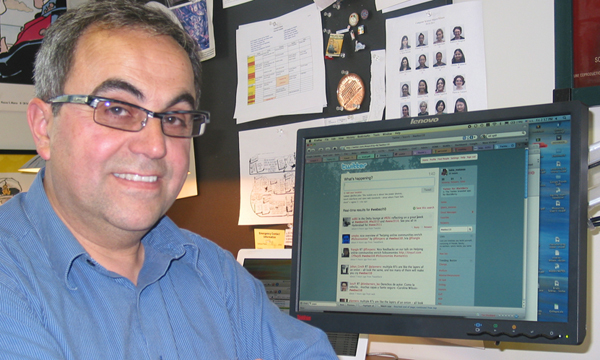Cyber Attacks May Have Affected Massachusetts Senate Election
Computer Science Shows How "Twitter-Bombs" Wield Influence
FOR IMMEDIATE RELEASE:
May 3, 2010 |
CONTACT: P. Takis Metaxas, pmetaxas@wellesley.edu; 781-283-3054
Arlie Corday
acorday@wellesley.edu; 781-283-3321
|
 |
| BOMBS AWAY: P. Takis Metaxas, Wellesley College computer scientist, has discovered how a Twitter-bomb may have affected a state election and the course of history. |
WELLESLEY,
Mass.— Twitter may have started out as just another social networking site. Yet more sinister uses have been ferreted out by a Wellesley College professor and his colleague.
"Who was hiding behind the first Twitter-bomb against (U.S. Senate candidate Martha) Coakley in the recent Massachusetts senatorial elections?" asks P. Takis Metaxas, associate professor of computer science. "Our research reveals that it was the same group of Iowa conservatives that attacked John Kerry in 2004."
Metaxas describes Twitter-bombing as creating a large number of Twitter accounts and sending a large number (in this case, about 1,000) of Tweets within a short period of time. The messages were used to "throw mud at Coakley, who was running for U.S. Senate," he added.
"I have computed a list of about 60,000 people who received these messages," Metaxas said. "I do not know, of course, who believed them, but I know that many propagated them for a day after the spamming Twitter accounts were shut down."
A Twitter-bomb reaches a large number of people very quickly. "In addition, because Google is displaying Twitter trends in a prominent place, you influence Google search results," Metaxas said.
The result is "disproportionate exposure to personal opinions, fabricated content, unverified events, lies and misrepresentations that would otherwise not find their way in the first page (of Google search results), giving them the opportunity to spread virally," say Metaxas and co-researcher and Wellesley postdoctoral fellow Eni Mustafaraj. They presented their findings in a research paper, "From Obscurity to Prominence in Minutes: Political Speech and Real-Time Search," at the 2010 conference WebScience10: Extending the Frontiers of Society On-Line, held April 26-27 in Raleigh, N.C. Well received, the paper won the conference's Best Paper Award. (See the paper online at http://journal.webscience.org/317/.
The phenomenon of a Twitter-bomb is now a reality due to a recent change in the way search engines return results.
"Recently, all major search engines introduced a new feature: real-time search results, embedded in the first page of organic search results," note Metaxas and Mustafaraj. "The content appearing in these results is pulled by Twitter, blogs and news Web sites within minutes of its generation."
News, opinion and information (or misinformation) can be spread virally almost instantly.
In an analysis of attacks launched through Twitter, Metaxas and Mustafaraj reveal that the assault was launched by the American Future Fund, the same group that attacked John Kerry's record during his campaign for the U.S. presidency in 2004.
"They were hiding behind an anonymous Web site for a couple of months and they surfaced after that, probably because they thought that nobody had kept a record of their doings," Metaxas said.
The site created by the American Future Fund is located at http://www.coakleysaidit.com/. For more on the group, go to http://iowaindependent.com/4203/secrets-of-the-american-future-fund.
The lessons to be learned from this study may help prevent smear campaigns in the future.
"I believe that the battles over social media will intensity in the next elections as one can reach directly many people with a fraction of the cost of TV ads," Metaxas said. "However, the software we are developing will make it easier to detect spammers real-time."
Since 1875, Wellesley College has been a leader in providing an excellent liberal arts education for women who will make a difference in the world. Its 500-acre campus near Boston is home to 2,300 undergraduate students from all 50 states and 75 countries.
### |

